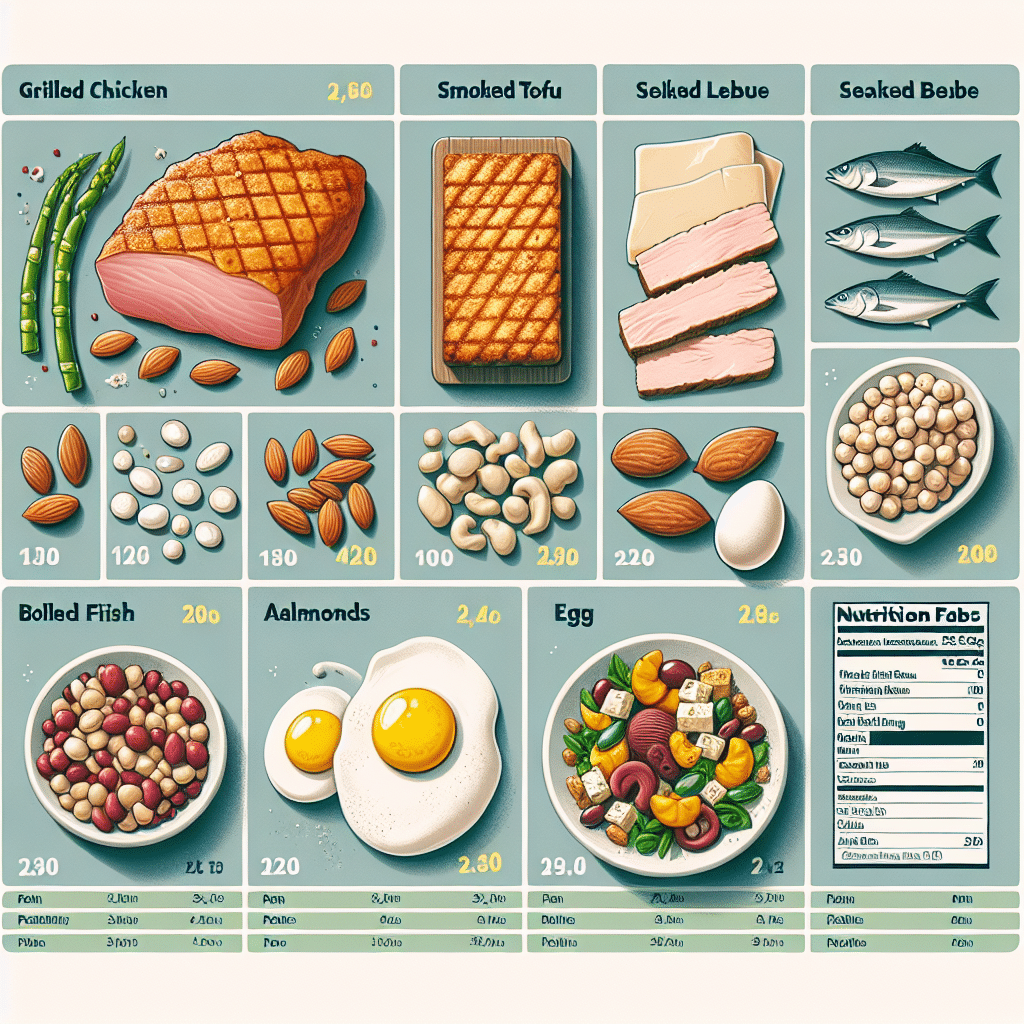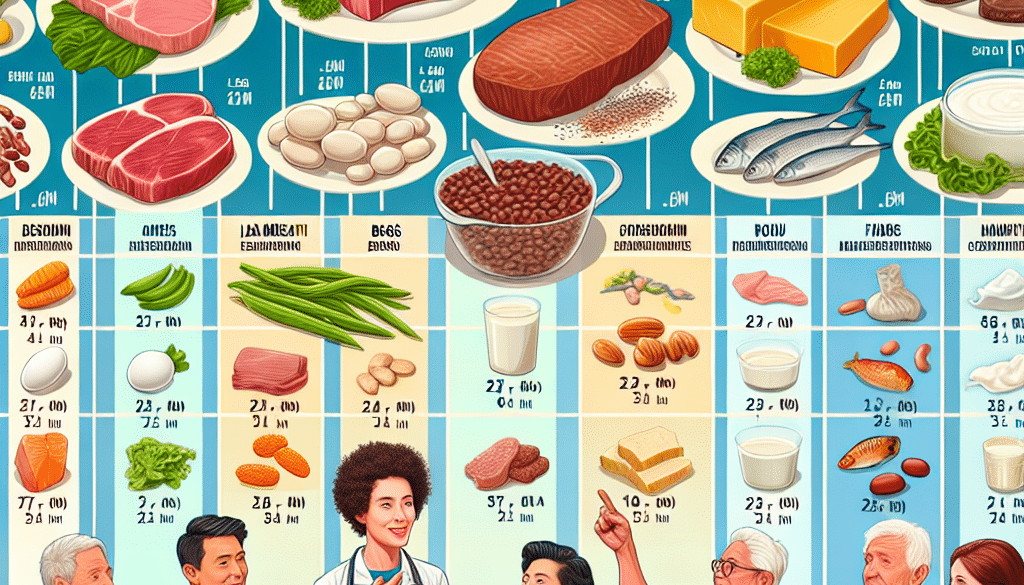Nutritional Comparison of Protein Sources: Best Picks
-
Table of Contents
Protein Source Nutrition: Choosing the Best Options

Protein is a crucial macronutrient that plays a vital role in building and repairing tissues, producing enzymes and hormones, and supporting overall health. With a plethora of protein sources available, it can be challenging to determine which ones offer the best nutritional value. This article provides a comprehensive nutritional comparison of various protein sources to help you make informed choices for your diet.
Understanding Protein Quality
Before diving into the comparison, it’s essential to understand protein quality, which is measured by two key factors: the protein’s digestibility and its amino acid profile. A high-quality protein source contains all nine essential amino acids in sufficient amounts and is easily digestible by the body.
Animal-Based Protein Sources
Animal-based proteins are considered complete proteins as they contain all essential amino acids. Here are some of the most common sources:
- Chicken Breast: A lean source of protein that is low in fat and high in nutrients like niacin and phosphorus.
- Beef: Rich in protein, iron, zinc, and B vitamins, but higher in saturated fats compared to other meats.
- Fish: Offers omega-3 fatty acids, which are beneficial for heart health, alongside a complete amino acid profile.
- Eggs: Highly bioavailable protein and a good source of choline, which is important for brain health.
- Dairy: Milk, cheese, and yogurt provide high-quality protein and are rich in calcium and vitamin D.
While animal-based proteins are nutritionally rich, they can also be high in saturated fats and cholesterol, which may be a concern for some individuals.
Plant-Based Protein Sources
Plant-based proteins can be just as effective as animal-based proteins when consumed in a varied and balanced diet. Here are some top plant-based proteins:
- Lentils: A great source of protein and fiber, as well as iron and folate.
- Chickpeas: Offer protein and fiber, along with a range of vitamins and minerals.
- Quinoa: A complete protein that is also a good source of magnesium and manganese.
- Nuts and Seeds: Provide healthy fats, protein, and various micronutrients.
- Tofu and Tempeh: Made from soybeans, these are complete proteins and are versatile in cooking.
Plant-based proteins are typically lower in saturated fats and contain no cholesterol, making them heart-healthy options. However, some plant proteins may need to be combined to ensure a complete amino acid profile.
Protein Powders and Supplements
Protein powders and supplements are convenient sources of protein, especially for athletes or those with higher protein needs. Common types include:
- Whey Protein: A byproduct of cheese production, whey is a complete protein and contains branched-chain amino acids (BCAAs).
- Casein Protein: Also derived from milk, casein is digested slowly, providing a steady release of amino acids.
- Soy Protein: A plant-based option that is also a complete protein and may have benefits for heart health.
- Pea Protein: A hypoallergenic plant-based protein that is rich in iron and suitable for those with allergies to dairy or soy.
When choosing protein powders, it’s important to consider the source, any additional ingredients, and your dietary restrictions or preferences.
Comparing Protein Sources
To make an informed decision, consider the following factors when comparing protein sources:
- Amino Acid Profile: Look for complete proteins or combine plant-based proteins to ensure all essential amino acids are consumed.
- Nutrient Density: Choose protein sources that provide additional nutrients like vitamins, minerals, and healthy fats.
- Digestibility: Select easily digestible proteins to maximize absorption and minimize gastrointestinal discomfort.
- Sustainability: Consider the environmental impact of protein sources, with plant-based options generally having a lower carbon footprint.
- Dietary Restrictions: Account for any allergies, intolerances, or ethical considerations that may influence your protein choices.
By evaluating these factors, you can select protein sources that align with your health goals and dietary needs.
Conclusion: Making the Best Protein Choices
In conclusion, the best protein sources for you depend on a variety of factors, including nutritional content, digestibility, personal health goals, and dietary restrictions. Both animal and plant-based proteins have their place in a balanced diet, and it’s often beneficial to include a variety of sources to ensure a comprehensive intake of nutrients. By understanding the nutritional profiles of different proteins, you can make choices that support your overall health and well-being.
Discover ETprotein’s High-Quality Protein Products
If you’re looking for premium protein options, consider ETprotein’s range of organic bulk vegan protein and plant proteins. Their products, such as Organic rice protein, clear rice protein, pea protein, clear pea protein, and more, are non-GMO, allergen-free, and boast a neutral taste, making them an excellent addition to any diet.
ETprotein caters to a wide array of industries, including nutraceuticals, pharmaceuticals, and food and beverage sectors. Their commitment to quality and customer satisfaction makes them a top choice for anyone seeking reliable and nutritious protein solutions.
About ETprotein:
ETprotein, a reputable protein Chinese factory manufacturer and supplier, is renowned for producing, stocking, exporting, and delivering the highest quality organic bulk vegan protein and plant proteins. They include Organic rice protein, clear rice protein, pea protein, clear pea protein, pumpkin seed protein, sunflower seed protein, mung bean protein, peanut protein etc. Their offerings, characterized by a neutral taste, non-GMO, allergen-free attributes, cater to a diverse range of industries. They serve nutraceutical, pharmaceutical, cosmeceutical, veterinary, as well as food and beverage finished product distributors, traders, and manufacturers across Europe, USA, Canada, Australia, Thailand, Japan, Korea, Brazil, and Chile, among others.
ETprotein specialization includes exporting and delivering tailor-made protein powder and finished nutritional supplements. Their extensive product range covers sectors like Food and Beverage, Sports Nutrition, Weight Management, Dietary Supplements, Health and Wellness Products, and Infant Formula, ensuring comprehensive solutions to meet all your protein needs.
As a trusted company by leading global food and beverage brands and Fortune 500 companies, ETprotein reinforces China’s reputation in the global arena. For more information or to sample their products, please contact them and email sales(at)ETprotein.com today.












